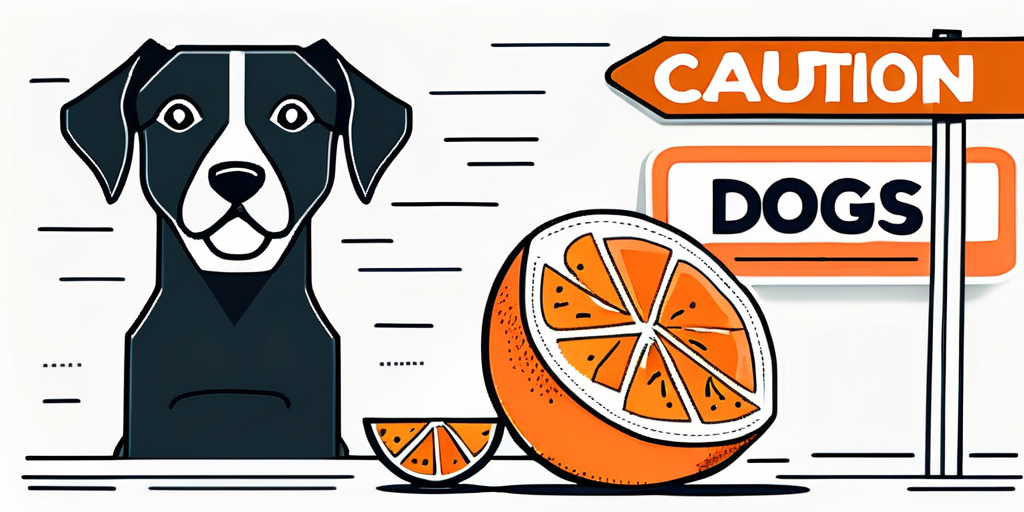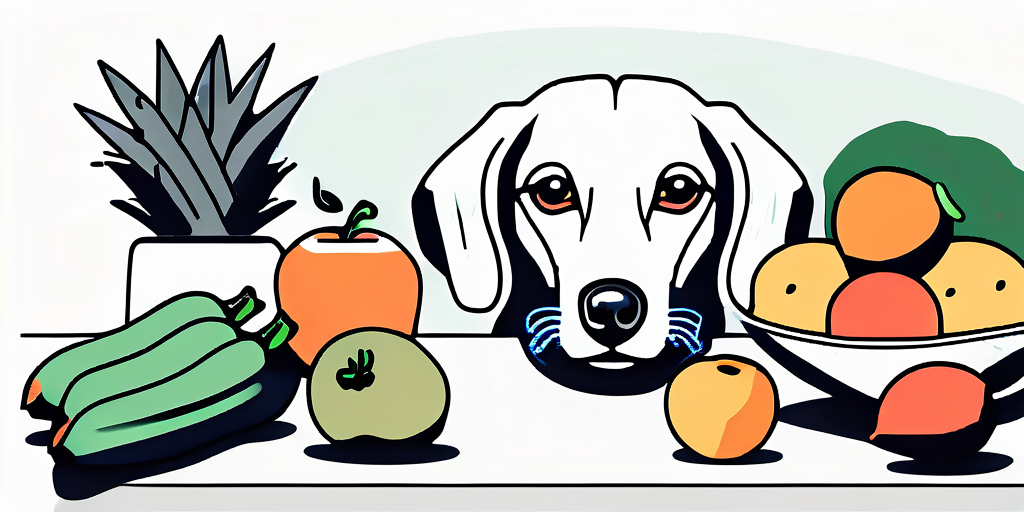Understanding a Dog’s Dietary Needs
Dogs have specific dietary needs that differ from humans. It is important to understand their digestive system and the essential nutrients they require for optimal health. By providing a well-balanced diet, we can ensure their overall well-being.
The Canine Digestive System
The canine digestive system is adapted for a carnivorous diet. Their digestive systems are shorter and simpler compared to humans, allowing them to efficiently digest and absorb nutrients from animal-based protein sources.
However, dogs are also capable of digesting certain plant-based foods, including fruits. While fruits should not be a primary food source for dogs, they can offer some nutritional benefits in moderation.
When it comes to fruits, it’s important to know which ones are safe for dogs to consume. For example, oranges can be a great source of vitamin C for dogs. This essential vitamin plays a crucial role in boosting their immune system and promoting overall health. However, it’s important to remove the seeds and peel before giving oranges to your furry friend, as they can be difficult to digest and may cause gastrointestinal issues.
Essential Nutrients for Dogs
It is crucial to provide dogs with a diet that fulfills their nutritional needs. Dogs require various essential nutrients such as proteins, fats, carbohydrates, vitamins, and minerals to support their growth, energy levels, and overall health.
While meat-based proteins are the foundation of their diet, dogs can obtain certain vitamins and minerals from fruits like oranges. In addition to vitamin C, oranges also contain potassium, which is important for maintaining proper heart function and muscle health in dogs. However, it’s important to remember that fruits should only make up a small portion of their diet, and the majority of their protein should come from animal sources.
When it comes to carbohydrates, dogs can benefit from complex carbohydrates found in whole grains like brown rice or quinoa. These carbohydrates provide a slow and steady release of energy, keeping your dog energized throughout the day. Additionally, whole grains are a good source of fiber, which aids in digestion and helps maintain a healthy weight.
The Nutritional Profile of Oranges
Oranges are known for their high vitamin C content, but they offer other essential nutrients as well. Let’s take a closer look at the vitamins and minerals found in this citrus fruit.

Vitamins and Minerals in Oranges
Oranges are not only a delicious and refreshing snack, but they also pack a punch when it comes to vitamins and minerals. As mentioned, oranges are rich in vitamin C, which plays a vital role in supporting the immune system, improving skin and coat health, and aiding in collagen production. But that’s not all!
In addition to vitamin C, oranges contain small amounts of vitamin A, which is important for maintaining healthy vision and promoting growth and development. Vitamin B6, another nutrient found in oranges, helps the body produce neurotransmitters that regulate mood and support brain health.
When it comes to minerals, oranges are a good source of calcium, which is essential for strong bones and teeth. They also contain potassium, an electrolyte that helps maintain proper fluid balance, nerve function, and muscle contractions.
Sugar and Fiber Content in Oranges
While oranges contain natural sugars, they are relatively low in calories compared to other fruits. This makes them a great choice for those watching their calorie intake. The natural sugars found in oranges are accompanied by dietary fiber, which offers a range of health benefits.
Dietary fiber plays a crucial role in digestion, promoting regular bowel movements and preventing constipation. It also helps regulate blood sugar levels, making oranges a suitable choice for individuals with diabetes or those looking to manage their blood sugar levels.
However, it is important to note that excessive sugar intake can lead to weight gain and other health issues in dogs. Therefore, oranges should be given in moderation as part of a balanced diet. Always consult with your veterinarian before introducing any new foods to your pet’s diet.
Potential Health Benefits of Oranges for Dogs
When fed in moderation, oranges can offer several health benefits to dogs.
Boosting Immunity in Dogs
Oranges are an excellent source of vitamin C, which is known for its immune-boosting properties. Adequate vitamin C intake can help strengthen a dog’s immune system, making them more resistant to illnesses and infections.
Digestive Health and Oranges
The natural fiber present in oranges can aid in maintaining a healthy digestive system for dogs. It promotes regular bowel movements, prevents constipation, and supports overall gut health.
In addition to these benefits, oranges also contain other essential nutrients that can contribute to a dog’s overall well-being. Oranges are rich in potassium, a mineral that plays a crucial role in maintaining proper heart function and regulating blood pressure. By including oranges in a dog’s diet, pet owners can help support their furry friend’s cardiovascular health.
Furthermore, oranges are a good source of antioxidants, which can help combat the harmful effects of free radicals in a dog’s body. Free radicals are unstable molecules that can cause oxidative stress and damage cells. By incorporating oranges into a dog’s diet, pet owners can provide their canine companions with a natural defense against oxidative stress and promote cellular health.
It is important to note that while oranges can provide health benefits to dogs, they should be given in moderation. Too much citrus fruit can upset a dog’s stomach and potentially lead to gastrointestinal issues. Additionally, it is crucial to remove any seeds or peels from the oranges before feeding them to dogs, as these parts can be difficult to digest and may pose a choking hazard.
Risks and Precautions When Feeding Oranges to Dogs
While oranges can offer health benefits, it is vital to be aware of the potential risks and take necessary precautions when feeding them to dogs. Dogs have different dietary needs and sensitivities compared to humans, so it’s important to understand how oranges can affect them.

One of the possible side effects of oranges in dogs is an upset stomach or diarrhea. This can occur if they consume large amounts of oranges or other citrus fruits. The acidity of citrus fruits can irritate their digestive system, leading to discomfort and digestive issues. It’s always best to introduce new foods to your dog’s diet gradually, including oranges, to monitor their reaction and ensure they tolerate it well.
Possible Side Effects of Oranges in Dogs
Some dogs may experience an upset stomach or diarrhea if they consume large amounts of oranges or other citrus fruits. This is due to the acidity of citrus fruits, which can irritate their digestive system. While this is not a common occurrence, it’s essential to be mindful of your dog’s individual tolerance to oranges.
In addition to digestive issues, another potential side effect of oranges in dogs is an allergic reaction. Just like humans, dogs can develop allergies to certain foods, including oranges. If you notice any signs of an allergic reaction, such as itching, swelling, or difficulty breathing, it’s crucial to seek veterinary attention immediately.
Safe Serving Suggestions for Dogs
When feeding oranges to dogs, it is crucial to peel them and remove any seeds. The peel and seeds can pose a choking hazard and may contain compounds that can be harmful to dogs. While the flesh of the orange is safe for dogs to consume in moderation, it’s important to avoid giving them the peel or seeds.
Additionally, it is recommended to introduce oranges gradually into a dog’s diet to monitor their reaction and ensure they tolerate it well. Treat oranges as an occasional snack or training reward rather than a staple food source. Remember, a balanced and complete diet for your dog should primarily consist of their regular dog food, and oranges should only be given as a supplement or treat.
It’s also worth noting that not all dogs enjoy the taste of oranges. Some may find the citrus flavor too strong or simply have no interest in it. If your dog shows disinterest or reluctance to eat oranges, it’s best to respect their preferences and not force them to consume it.
Alternatives to Oranges for Dogs
If oranges are not readily available or if you prefer to offer alternative fruits to your dogs, there are other safe options to consider.

Other Fruits Safe for Dogs
While oranges can be a healthy treat for dogs, there are several other fruits that are safe and beneficial for our furry friends. One such fruit is apples. Apples are not only delicious but also packed with vitamins A and C, as well as fiber. Just be sure to remove the seeds and core before offering them to your dog, as these can be a choking hazard.
Bananas are another great option. They are rich in potassium, which helps support heart health and muscle function. Plus, bananas are easy to digest and can provide a quick energy boost for your pup. Just remember to peel the banana and cut it into small, bite-sized pieces for your dog to enjoy.
Blueberries are also a fantastic choice. These tiny berries are packed with antioxidants that can help boost your dog’s immune system and promote overall health. You can offer them fresh or frozen, and they make a great addition to your dog’s regular diet.
Watermelon is another fruit that dogs can enjoy. It is not only hydrating but also a good source of vitamins A and C. Just make sure to remove the seeds and rind before offering it to your furry friend. Watermelon can be a refreshing treat, especially on hot summer days.
Healthy Treat Options for Dogs
If you prefer to offer treats specifically formulated for dogs, there are many healthy options available. Look for treats made with natural ingredients and fortified with essential nutrients to provide a balanced snack for your furry friend. Some treats even have added benefits, such as promoting dental health or supporting joint function.
When choosing treats for your dog, it’s important to consider their individual needs. For example, if your dog has food allergies or sensitivities, you may want to opt for grain-free treats. Additionally, if your dog is on a weight management plan, there are low-calorie treats available that can still satisfy their cravings without adding extra pounds.
Remember, treats should be given in moderation and should not exceed 10% of your dog’s daily caloric intake. It’s always a good idea to consult with your veterinarian to determine the best treat options for your dog based on their specific dietary needs.
In conclusion, while oranges are a safe and nutritious option for dogs, there are plenty of other fruits and treats that can provide a variety of flavors and health benefits. From apples to watermelon, there are many options to choose from. Just remember to introduce new fruits gradually, remove any seeds or pits, and monitor your dog’s response. As responsible pet owners, we should always prioritize a well-balanced diet tailored to meet our dogs’ specific nutritional requirements and consult with a veterinarian for personalized advice on their dietary needs.
